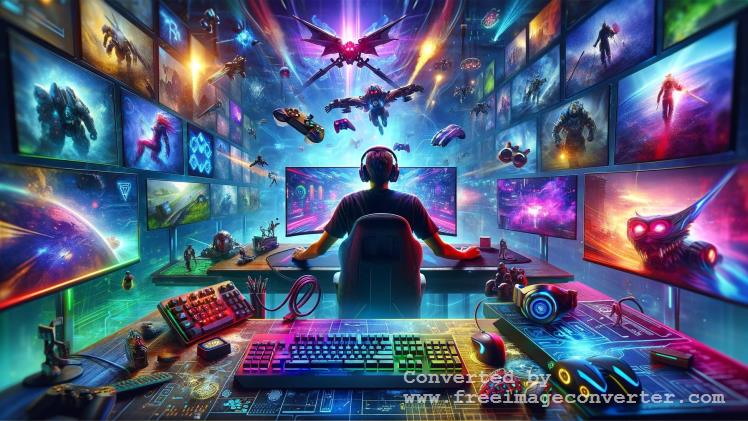In the rapidly evolving world of online slot, emerging technologies are continuously reshaping the landscape. From enhanced graphics to immersive virtual realities, these technological advancements are not only elevating the gaming experience but also influencing how players interact and engage with digital worlds. This article explores the significant impact of emerging technologies on online gaming and what the future holds.
1. Advancements in Graphics and Visuals
One of the most noticeable impacts of emerging technologies on online gaming is the dramatic improvement in graphics and visual fidelity. With the advent of powerful GPUs and sophisticated rendering techniques, games now feature incredibly detailed environments and realistic character models. Technologies like ray tracing and high dynamic range (HDR) enhance lighting and shadow effects, creating more immersive and lifelike experiences.
2. Virtual Reality (VR) and Augmented Reality (AR)
Virtual Reality (VR) and Augmented Reality (AR) have revolutionized the way players experience games. VR immerses players in a fully interactive 3D environment, allowing them to physically move and interact within the game world. AR, on the other hand, overlays digital elements onto the real world, blending virtual objects with physical surroundings. Both technologies offer new gameplay mechanics and experiences, pushing the boundaries of traditional gaming.
3. Artificial Intelligence (AI) in Gaming
Artificial Intelligence (AI) plays a crucial role in enhancing game design and player experience. AI algorithms enable non-player characters (NPCs) to exhibit more realistic behaviors and adapt to players’ actions. This creates dynamic and unpredictable gameplay scenarios. Additionally, AI-driven tools assist in procedural content generation, allowing for more expansive and varied game worlds without manual design effort.
4. Cloud Gaming
Cloud gaming represents a significant shift in how games are accessed and played. By streaming games over the internet rather than relying on local hardware, players can enjoy high-quality gaming experiences on a variety of devices, including smartphones and tablets. This technology reduces the need for expensive gaming hardware and makes high-end games more accessible to a broader audience.
5. Blockchain and NFTs
Blockchain technology and Non-Fungible Tokens (NFTs) are making their mark in the gaming industry by introducing new ways to own and trade digital assets. Blockchain provides transparency and security for in-game transactions, while NFTs enable players to buy, sell, and trade unique digital items, such as rare skins or virtual real estate. These innovations are creating new economic models and opportunities within the gaming ecosystem.
6. 5G Connectivity
The rollout of 5G networks promises to significantly enhance online gaming experiences through faster and more reliable internet connections. With reduced latency and higher data transfer speeds, players can expect smoother gameplay, quicker load times, and enhanced multiplayer experiences. This technology also supports the growth of cloud gaming and AR applications by providing the necessary bandwidth for real-time interactions.
7. Enhanced Audio Technologies
Audio technology advancements are also playing a pivotal role in online gaming. Spatial audio and advanced sound processing techniques create a more immersive audio experience, allowing players to hear in-game sounds with greater precision and clarity. This enhances the overall atmosphere and can provide a competitive edge in games that rely on audio cues.
8. Mixed Reality (MR)
Mixed Reality (MR) combines elements of both VR and AR to create hybrid experiences that blend virtual and real worlds. MR technologies enable players to interact with digital objects within their physical environment, providing unique gameplay opportunities. This technology is still in its early stages but holds great potential for innovative gaming experiences.
9. Haptic Feedback
Haptic feedback technology enhances the tactile experience of gaming by providing physical sensations in response to in-game actions. Advanced controllers and VR accessories use haptic feedback to simulate textures, impacts, and vibrations, making interactions feel more real. This technology adds another layer of immersion and engagement to online gaming.
10. Procedural Generation
Procedural generation uses algorithms to create game content dynamically rather than relying on pre-designed assets. This technology allows for the generation of vast and varied game worlds, ensuring that each player’s experience is unique. It is particularly useful in open-world games and sandbox environments, where diverse and unpredictable content is crucial.
11. Smartphone Integration
With the increasing capabilities of smartphones, gaming experiences are no longer limited to traditional consoles and PCs. Mobile gaming has seen a surge in popularity, with many games now optimized for touchscreens and portable devices. Technologies such as mobile GPUs and cloud computing are enabling more complex and graphically intensive games on smartphones.
12. Wearable Technology
Wearable technology, including smartwatches and fitness trackers, is beginning to influence online gaming. These devices can track physical activity and health metrics, which can be integrated into games for a more personalized experience. For example, fitness games can use wearable data to adjust difficulty levels based on the player’s real-time performance.
13. Machine Learning and Data Analytics
Machine learning and data analytics are increasingly being used to analyze player behavior and preferences. This data helps developers create more engaging and tailored gaming experiences by understanding player patterns and adjusting game elements accordingly. It also allows for better matchmaking and personalized content delivery.
14. Social and Streaming Integration
Emerging technologies are enhancing the social aspects of gaming through integration with streaming platforms and social media. Players can easily share their gameplay experiences, participate in live-streamed events, and connect with others in the gaming community. This integration fosters a more interactive and communal gaming environment.
15. Future Perspectives
Looking ahead, emerging technologies will continue to drive innovation in online gaming. Advancements in AI, VR/AR, and connectivity will further blur the lines between virtual and real worlds, creating new opportunities for immersive and interactive experiences. As these technologies evolve, they will shape the future of online gaming, offering exciting possibilities for both players and developers.
In conclusion, the impact of emerging technologies on online gaming is profound and multifaceted. From enhanced graphics and immersive experiences to new economic models and social interactions, these advancements are continually transforming the gaming landscape. As technology progresses, the potential for new and innovative gaming experiences will only expand, promising an exciting future for gamers worldwide.






